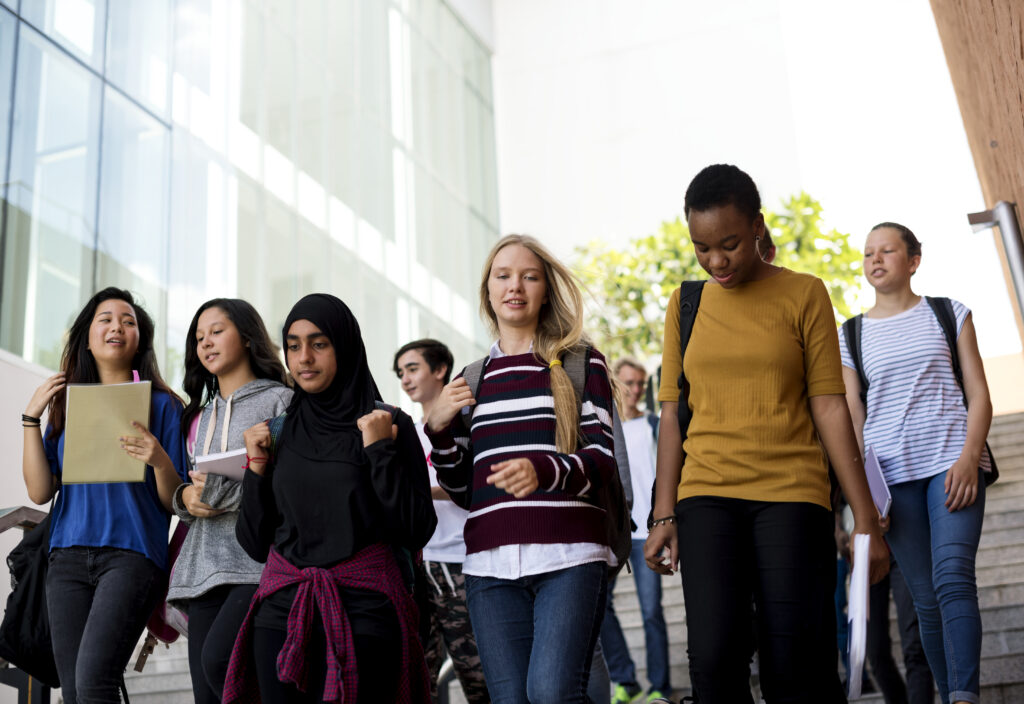Written by Isabel Burnett
UK migration as a politicised topic
Immigration has long been a heated topic in UK politics. Successive prime ministers and governments have focused on “stopping the boats” (Rishi Sunak), stopping “uncontrolled immigration” (Boris Johnson), and creating an altogether “hostile environment” for migrants (Theresa May). Ahead of the Brexit referendum, the Vote Leave campaign had even suggested that the UK was at “breaking point” (Nigel Farage), with regard to the numbers of people moving here.
Mainstream media narratives often portray migrants either as threats or merely as passive victims of global conflicts. Such narratives normalise severe policies, from proposals to send asylum seekers to the remote Ascension Islands to the now-defunct Rwanda plan—which cost taxpayers £700 million but saw only four people voluntarily leave for the East African country. It also shapes how the UK public now see migration as a priority issue. An Ipsos survey in August 2024 found it to be the top issue for the first time since 2016—surpassing ‘inflation’, ‘the NHS’, and ‘the economy’ which were prioritised in the spring of the same year, before the anti-immigration riots exploded around the country.
People migrate to the UK for many reasons, including education, work, family, and for safety and peace. This series investigates the different visa regimes migrants in the UK might experience and explores the surrounding issues.
International students – the changing political and economic landscape
Often international students come to the UK to pursue a world-class education, in what is commonly perceived abroad as a multicultural and welcoming society. Since English is taught worldwide, the UK is considered a sensible choice for many prospective students. It is certainly much cheaper to study here than in the US, which also draws many foreign students.
The proportion of international students in UK universities overall has doubled over the past two decades—from 12% in 2001 to 24% in 2021. In 2022, 38% more international student visas were issued compared to the previous year. This recent rise is due to more students coming from outside the EU, with the most from China, India and Nigeria. Since post-Brexit rules came into force in 2021, student migration from the EU has more than halved.
The mainstream debates on migration often focus on people arriving by small boats. However, asylum seekers make up fewer than 7% of those migrating to the UK, while international students account for 38%, which is a surprisingly large share of the UK’s net migration figure.
International students account for 38% of UK migrants – and the figure has doubled in two decades
However, of all non-EU migrants issued an initial study visa in 2017, only 20% still had permission to remain in the UK five years later, suggesting that most international students do not settle permanently.
In 2022, 484,000 international student visas were issued, as well as 134,000 student dependent visas (eight times more than 2019). The Migration Observatory, based at the Centre on Migration, Policy and Society (COMPAS) at the University of Oxford states that “the migration of international students and their family members is the largest single group explaining the rise in net migration since 2019”.

This rise in numbers likely motivated the government’s ban on the right of international Master’s students’ to bring partners or children to the UK in January 2024. That decision clearly had an impact on this year’s cohort of students, whose size fell by nearly a fifth. The number of UK students studying abroad also declined, from 40,000 in 2016 to 24,000 in 2022, which amounts to only 1.5% of total students, lower than the average for high-income countries.
Thus, there appears to be a tension between the government’s aim to reduce net migration and its claimed desire to increase the numbers of international students, whose tuition fees are widely acknowledged to be crucial for financially sustaining the UK’s university system. International student fees (£11.8 billion) accounted for 23% of UK universities’ income in 2022, up from 5% in the mid 1990s and 15% in 2016. Inflation has eroded the value of home student fees since they were capped in 2017, leading institutions to increasingly rely on international student fees for income. The marketisation of education has driven universities to expand student numbers and stretch staff workloads, inevitably influencing the quality of education offered.
International students contribute a net benefit of £42 billion to the UK economy
International students contribute a net benefit of £42 billion (Higher Education Policy Institute: 2023) to the UK economy, as higher education has become one of the country’s major service exports. Last summer, the new education secretary, Bridget Phillipson, welcomed international students to the UK in a speech, in which she praised their contributions to the arts, music, sport, food, language and humour as well as their ability to drive dynamism. Expressing her passion for an “open, global Britain,” she emphasised that the relationship was not simply a “hard-nosed transactional” one focused on “GDP, balance sheets or export receipts”. However, despite this welcoming stance, Labour have not announced plans to reverse the Conservatives’ law and allow Master’s students to bring their dependents to the UK.
It is true that international students benefit society greatly; entrepreneurs such as the Austrian and French (respectively) founders of Duco and Oxford Space Systems, and the celebrated Ghanian-born publisher Margaret Busby, all stayed in the UK after their studies. While the cultural enrichment that international students bring to the UK is valuable, perhaps the UK could also facilitate opportunities for UK students to study abroad to broaden their own horizons and contribute to global cultural exchange. The Labour government instead rejected proposals for a renewed Youth Mobility Scheme and has “no plans” to re-enter the Erasmus+ scheme, with the funding of the replacement Turing scheme not yet confirmed beyond 2025. Moreover, those educated at UK universities are mostly renowned in their own countries; indeed, UK university alumni make up over one quarter of the heads of states globally.
Voices of international students: Navigating rights, challenges, and opportunities in the UK

As well as high tuition fees, international students in the UK must pay the Immigration Health Surcharge (IHS), which charges migrants with temporary visas for access to NHS healthcare. In 2024, the IHS increased by two-thirds, requiring international students to pay £776 per year, on top of a £490 visa application fee. International students may also incur additional costs for any necessary medical or English-language exams and certificates.
One student, known as “H”, from China, said that these processes at times felt as if the UK was “reaping profit from students”. Another student, “Tyson” from India, lamented that many people were deprived of the opportunity to pursue PhDs in the UK, despite being fully-funded, because they could not afford to pay the upfront costs: four years’ worth of IHS and visa fees total around £4000, which is required to be paid in full rather than in annual instalments. A student from Peru noted that the costs of the Graduate Visa had risen, but the salaries offered did not always compensate the investment.
Some international students cannot afford to study in UK despite fully funded PhD courses
After graduating, international students can live and work in the UK for two years by switching to a Graduate Visa, which also requires paying two years’ worth of IHS and visa fees upfront. Without a guaranteed job offer, many see this as a significant risk. Several students expressed concern that they had a short timeframe in which to secure a job, allowing them to remain in the country; one student viewed the Graduate Visa as a “waste of time” if it did not lead to a work visa. However, a Palestinian student who studied for multiple Master’s degrees did choose the Graduate Visa—incurring considerable debt and personal expense—in order to pursue the 10-year route to settlement (after 11 years’ residence in the UK, a migrant can apply for British citizenship). For some, the Graduate Visa is a valuable option.
While most students interviewed found the visa application process straightforward, several faced delays, which were often due to administrative errors.

Many students praised their universities for the support they had provided in resolving issues and helping them to acclimate to UK culture. However, it was said that the requirement to apply for student visas from one’s home country sometimes posed challenges, particularly for those already residing in the UK. One student recounted the financial strain of having to leave the UK to apply for their visa, which must be done within 28 days of the course start date.
Some students reported a sense of distrust from UK border and customs officers, saying that they had encountered questions about their motives for entering the country when returning from trips to the European Union.
Although most felt valued by their universities, a minority expressed concerns that their contact with university staff might have been motivated more by attendance monitoring than by substantive teaching. Universities have a responsibility to track international students’ attendance at various points throughout the year; consecutive unexplained absences can be reported to the university’s Visa Compliance Team, possibly resulting in expulsion from the university and, at worst, deportation.
All international students have the right to work a maximum of 20 hours per week, which many deemed adequate, though some students felt that it limited their job opportunities. Moreover, the rights of international students differ depending on their nationality. For instance, some students have to apply for a special Academic Technology Approval Scheme (ATAS) certificate to gain security clearance to study particular subjects (which can take three to six months to obtain), while students of other nationalities are exempt and can study straight away.
Students from Commonwealth countries such as India, Nigeria, Singapore, Kenya, Jamaica, Canada, and others can benefit from a post-British Empire legal agreement that allows them to vote in UK elections—a right that many do not even know that they have.
Some international students are eligible to vote in UK elections
Looking ahead
International students are often overlooked in the politicised debates on migration, yet they are certainly affected by the negative perceptions: a culture that perceives immigrants as a threat misses invaluable opportunities for meaningful exchange. The friendships formed between UK and international students can create lasting bonds, fostering cultural enrichment, learning, creativity, and collaboration. In our globalised world, we face complex and interconnected challenges that require collective solutions. The UK’s education system should view international students not merely as sources of profit but as contributors who can nurture a global perspective. As well as welcoming international students,the UK government could facilitate opportunities for UK students to study abroad, by implementing a renewed Youth Mobility Scheme or increasing exchange programs, rather than relying solely on international students to foster global connections.
If you are an international student and need some support:
Your university’s Student’s Union – Unions are independent of the university and in most cases is affiliated to the National Union of Students (NUS). They will have an International Students Officer.
Your university’s international office – All universities have an office dedicated to international students. The special team can provide advice on immigration, employment, funding, academic and personal matters.
UKCISA https://www.ukcisa.org.uk/ – offer an advice line for students and up-to-date information about Brexit, immigration, fees, student support, working and living in the UK for current and prospective international students.
Student Minds https://www.studentminds.org.uk/ – the UK’s student mental health charity, offering resources and a Text Support line through Student Space.
The British Councilhttps://www.britishcouncil.org/ – The British Council and their Study UK website offers practical information and insight on UK education for international students. They can help you understand the process of applying to university in the UK, inform you of scholarships available and also direct you to approved agents in your country that you can use to help you apply to a UK university.

